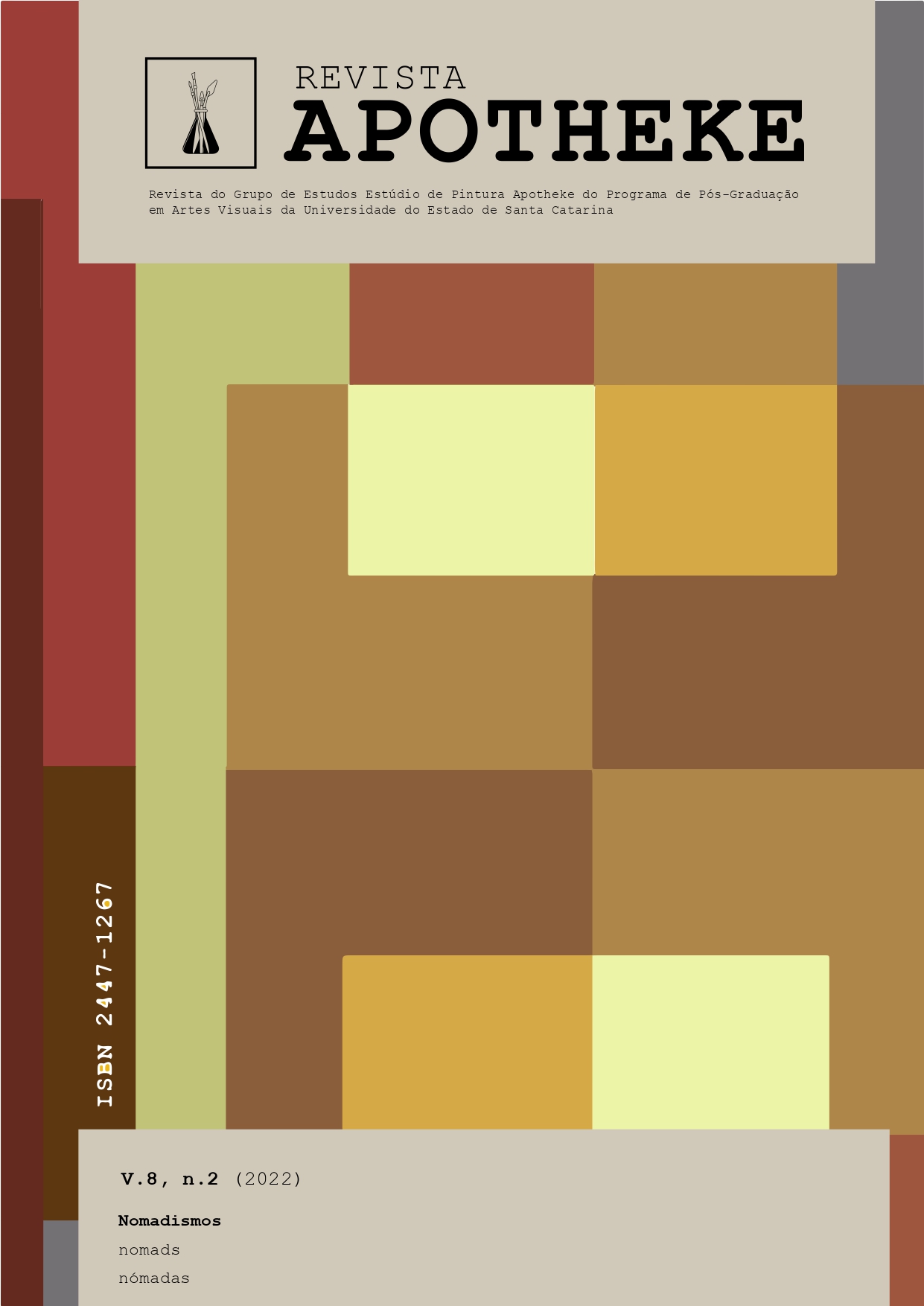Overflows in slam poetry: seeing, existing and occupying
DOI:
https://doi.org/10.5965/24471267822022174Keywords:
Slam Poetry, Visual Culture, OverflowAbstract
Slam poetry takes its inspiration from sports. This is precisely what this text is about: poetry as a game in which the poem hits in different directions and causes overflows. The poems created for the competitions, which take place from North to South of Brazil, become possibilities of aesthetic and poetic displacements. From the studies of visual culture, we focus on three perspectives of the context of Brazilian slams groups, which we call overflows: the overflow of seeing, of existing and, finally, the overflowing of occupying. Our journey through these edges that are blurred and overflowed, lead us to a poetic movement that triggers aesthetic-educational processes, either by the occupation of places, by the re-existence of other bodies or by the insertion in online screens and in schools.
Downloads
References
ALCADE, Emerson (org.). Coleção Slam. LGBTQIA+. V. 4, São Paulo: Editora Autonomia Literária, 2019.
BOLEÃO, Jossier Sales. Na rua não tem jeito de cair: poetry slam na ágora digital. In: MARTINS, Alice F.; RIBEIRO, Regilene A. Sarzi; FAKHOURY, Renata; PPONCE, Wendy Montes (Orgs.). Os signos na arte, na comunicação e nas cidades. 1a edição. Aveiro: Ria Editoral, 2020.
CIRÍACO, Rodrigo. Antologia Slam – Rachão Poético, Copa mundão de poesia. Edições Um Por Todos. São Paulo: Selo do Burro, 2019.
HERNÁNDEZ, Fernando. A cultura visual como um convite à deslocalização do olhar e ao reposicionamento do sujeito. In: MARTINS, Raimundo; TOURINHO, Irene (org.). Educação da Cultura Visual. Santa Maria: Editora UFSM. Edição do Kindle, 2020.
INTERNACIONAL SITUACIONISTA – ANTOLOGIA. Lisboa: Antígona, 1997.
MIRZOEFF, Nicholas. O direito a olhar. ETD – Educ. Temat. Digit. Campinas, São Paulo, v.18, nº 4, p. 745-768, out./ dez., 2016.
NASCIMENTO, Roberta Marques do. Vocigrafias. 2019. Tese (Doutorado em Comunicação e Semiótica) – Pontifícia Universidade Católica de São Paulo, São Paulo, 2019.
PRADA, Juan Martín. Otro tiempo para el arte. Cuestiones y comentarios sobre el arte actual. Valencia: Sendemà Editorial, 2012.
SMITH, Mark Kelly; KRAYNAK, Joe. Take the mic: The art of performance poetry, slam and the spoken word. Sourcebooks MediaFusion, 2009.
VILLADA, Camila Sosa. O parque das irmãs magníficas. São Paulo: Planeta, 2021.
Downloads
Published
How to Cite
Issue
Section
License
Copyright (c) 2022 Jossier Boleão, Alice Fatima Martins

This work is licensed under a Creative Commons Attribution-NonCommercial 4.0 International License.
Copyright and Licensing Policy
Authors of works submitted to Revista APOTHEKE authorize their publication in both print and digital formats exclusively for academic purposes. Reproduction is permitted, provided that the source is properly cited. Authors confirm the originality, authorship, and unpublished status of their manuscripts.
Articles published by the journal are freely available and intended for academic and non-commercial use only. All copyrights are transferred to the journal. The content of signed articles reflects the views of their respective authors and not the official position of Revista Apotheke. The author(s) agree to always cite the following reference when republishing or referring to the content originally published in Revista Apotheke:
“This article was originally published by Revista Apotheke in volume (insert volume), number (insert number), year (insert year), and is available at: http://www.revistas.udesc.br/index.php/APOTHEKE/index”
It is the sole responsibility of the authors to obtain written permission for the use of any material protected by copyright law included in their articles. Revista Apotheke is not responsible for copyright infringements committed by contributors.
Authors retain copyright and grant the journal the right of first publication, with the work licensed under a Creative Commons Attribution-NonCommercial License (CC BY-NC):
-
Attribution (BY): Licensees are allowed to copy, distribute, display, perform, and create derivative works, provided that proper credit is given to the author or licensor, in the manner specified.
-
NonCommercial (NC): Licensees may use the material only for non-commercial purposes.
After publication, authors retain the rights to their work and may republish the text.



